- Home
- Ian McDonald
Changa Page 2
Changa Read online
Page 2
The enigma of Iapetus with its dark and light hemispheres had fascinated generations of astronomers, science fiction writers and lovers of mysteries. The Voyager missions had only deepened the mystery. Hubble had squinted Saturnwards and added a few more lightside features to the atlases of the solar system but nothing to the Casini Regio debate. The new generation of big orbital telescopes had turned away from planetary astronomy to the grandeur of star birth and star death among the glowing gas sheets of the inner galaxy. With them went the professional star-watchers. The celestial back yard was left for the amateurs to play in. It was an Italian postman and part-time planet-spotter who noticed that there seemed to be less of the brightside of Iapetus than the last time he had looked at it. He had logged his observations into the astronomy nets. They had lain gathering data-dust for almost a month; then, when they began to provoke gossip, had drawn professional ridicule until someone had the courage to sneak a peek with the Mauna Kea reflector at the Saturnian System.
While the professionals bickered and prevaricated, sixty per cent of Iapetus’s surface had turned black. This could not, now be ignored. Projects were cancelled, time slots reassigned, funding found. Hubble and her sisters were swung back to Saturn. What they saw out there made lead lines in every primetime news slot. It was not so much that Iapetus was turning black, it was how it was turning black. The dark was closing in equally on all sides: the circle of bright white ice was dwindling like a focused-down spotlight.
Ten days later, all that remained was a white dot fifty kilometres across, threatened on all sides by the dark. Someone had calculated that the black was advancing across Iapetus at ten kilometres per hour.
The upper monitor displayed the nature of the catastrophe. NASA had overlain the dark disc with a topographic map. Iapetus’s surface features were named after figures from the Song of Roland. Roland himself had been among the first to fall; his soul-friend Oliver and mighty King Charlemagne not long after. The battle-plain of Roncevaux was taken; only Hamon stood against the encircling dark. Soon he too would fall and there would be no heroes any more.
‘What is that stuff?’ Gaby whispered. The light from the Copeland Islands beamed across the room. She thought of Marky, out there in the night in his car with his friends and his fast food and his expensive stereo playing his cheap music. It is a poor kind of human who is not a little afraid of the powers in the sky. You can hide from them and pretend that they do not exist and limit your life by your ignorance or you can go out from your strong, safe house into the night and call them out and maybe make sense of them to yourself and to the world.
Her father replaced Gaby at the telescope. ‘Thirty kilometres to full occultation,’ he said, fiddling with the eyepiece.
The pictures from Hubble were being updated every thirty seconds. The upper screen abruptly blanked. A new message appeared. Gaby read it.
‘Dad. There’s something here I think you should see.’
‘I think we’re going to miss full occultation. It’ll just be below the horizon. Damn.’
‘Hyperion’s disappeared.’
He was there in an instant.
It was on the screen: a Net-wide bulletin. At 20:35 GM’I September 8 2002, researchers using the Miyama Small Object orbital observatory reported the disappearance of Saturn’s sixteenth moon, Hyperion, from their monitors. Instantly. Totally. Inexplicably.
‘Jesus,’ said Gaby’s father, reverently.
‘How can that happen?’ Gaby asked.
‘I don’t know. I don’t think anyone knows.’
E-mail icons winked into existence along the top of the screen; the informational equivalent of the Irish Astronomical LocalNet shouting all at once.
‘The whole of the moon,’ Gaby said. Fresh information flooded downline from NASA. Voyager fly-by photographs and simulations of Hyperion: a blighted potato of a moonlet three hundred and fifty by two hundred and fifty by two hundred kilometres. Gone. The satellite’s final seconds came through image processing from Miyama control, frame by frame. For twenty frames nothing happened. On frame twenty-one Hyperion seemed to throw off its surface like the peel from an orange. Light glowed from the cracks, fanned from the torn open ridges and dorsae. Frames twenty-two to thirty-two were white. Pure white. Frame thirty-three was nothing. Just space and stars without any sign of the several trillion tons of rocky ice called Hyperion.
Total elapsed time of the moon’s destruction was four point three eight seconds.
The oak door to the Weather Room opened. The dogs came rushing in, running around and wagging their tails. Something had excited them. After them came Rebecca. She looked fearful.
‘It was on the news,’ she said. ‘They interrupted Spitting Image for it.’
‘Nothing left bigger than a hundred metres across,’ Dad read from the screen, ‘or the Small Object Array would have picked it up. They’re trying to tell us it was a cometary impact.’
‘And the next moon out goes black all over?’ Gaby said.
‘I think sensible people should be afraid of this,’ Reb said.
‘Sensible people are,’ her father said. On the monitor Hyperion’s final seconds were repeated, over and over.
They are trusting that they will find answers there, Gaby thought. They are trusting that those answers will make sense, that there are people who can explain why the world constantly surprises them. It does not have to be logical, forgivable or even sane, but eventually explicable in some way or other. That is why you must go away, because you want to be the person who has the answers to the question why?
It was easy now. It was surprising how little decision there was to be made when it came to it. A fire on the Point and the death of a moon had helped her, but she had always known, since she had posted off the application for the Network Journalism course, that in the end she would go. She wanted to tell them she was right and she was ready but her father was showing Reb what all the information coming through the Net meant.
Horace came and stood beside her, beseeching attention. She ruffled the fine, soft hair behind his ear. She pointed out to him the way she would be going; out there, past the lights of the ferry she had seen from the Point, far beyond the glow of the land, beyond even the reach of the lighthouses, to the open sea and the country on the other side of it. But he was only a big tan and white dog with a degenerative nervous disease, who understood nothing.
~ * ~
African Nightflight
1
Videodiary Entry: March 23 2008.
Ten thousand metres over the Equator.
Now we’ll see if it’s true. The Coriolis effect thing. Dr Dan probably thinks I’m either insane or have amoebic dysentery, but if you’ve got a Personal Data Unit that can give you exact time and location anywhere on the planet, how could you resist testing the old Plughole and Hemisphere Experiment?
God, I hope no one really has amoebic dysentery and needs to get in. Muttering from the portside toilet. Probably think I’m scoring lines, or applying for the Mile High Club.
What we are now seeing is the wash hand-basin of a Kenya Airways Airbus A-330. The PDU says we are travelling at eight hundred and eighty kilometres per hour; our location is twelve kays north of the Equator. Which - just a moment while I press a few buttons - is fifty seconds or so.
T-ten. I pull the plug. Lo! The water spirals clockwise. Three, two, one: Equator. And the water is running straight down the sides of the plughole. Now I’m in the southern hemisphere and, ta-dah! The water spirals anti-clockwise. Gaby McAslan proves that the earth moves in space. You know, I wasn’t totally convinced it would do that.
Gaby McAslan switched off the visioncam. The cabin staff were getting restless out there. They had obviously all read Airport. She sniffed the soap, rejected it, emptied out the clever little lockers and plundered them. The disposable razors would be useful. The men’s cologne did not smell too bad. Condoms. FlightMates. She took a handful more as a hope than a precaution. Her Malaria/Yellow Feve
r/HIV 1 and 2 inoculation scab itched sympathetically.
Back in executive, Dr Dan had ordered her another whisky on his government account.
‘Well, did it?’ he asked. His voice was gentle and very deep.
‘It did.’
He stirred his drink with a plastic swizzle stick shaped like an elongated giraffe.
‘I suppose it is a kind of cancer,’ he said. Executive class was being woken up with passion-fruit juice and microwaved croissants. The plane was well into its descent path. ‘The Chaga, I mean. As there are sicknesses that eat a person’s life away from inside, so there are diseases of nations. It invades the land, draws strength from it, kills what it finds and duplicates only itself. While we sit here contemplating our croissants, it is growing, it is spreading. It never sleeps. Even the name you have given it is not its own, but has been taken from the people who once lived there: what else can it be, Ms McAslan, than a cancer?’
He glanced out the window. Nothing to see in the pre-dawn dark but engine glow and the flicker of warning beacons.
‘So early in the task of nation-building, too. Why, we have scarcely fifty years of history behind us and suddenly, boom!’ He softly smacked heel of hand into palm. ‘Surely, God is not kind to Kenya: just as the information revolution was allowing us to take our true place in the world, we find we must go hand open to the United Nations. We shall certainly not have fifty more years. What is it they are estimating? Twenty more until the country is overrun? Seventy years is not time to be a nation. Why could it not have come down in France or England, where they have too much history; or China or India, where they have so much past they do not know what to do with it? Or America, where at least they could turn being made into another planet into a theme park.’
In the course of her professional travel, Gaby McAslan had come to dread airline booking computers and their malicious humour. They put you next to terrible people. The noisiest eater in the world. The man with the one long hair coming down his nose that you couldn’t take your eyes off until you wanted to reach over and tear it out by its follicle. The teenager whose Discman would hiss and whisper away in the high treble notes. The person who had memorized every word of Monty Python’s Life of Brian.
Sometimes the computers relented. Then their favour shone upon you.
‘You will pardon me if I blaspheme,’ the big, heavy, black man in the next seat had said as the Airbus turned on to Heathrow’s main runway and throttled up. ‘I am not a very good flier, I am afraid.’ He had sunk his fingers into the armrest and stared at his feet. As the plane lifted off, he very reverently whispered, ‘Jesus.’
He was Dr Daniel Oloitip. You would not think to look at him, but he was Masai.
‘I have become a city creature, sleek and soft,’ he had apologized. ‘But mostly old.’
‘I like your ear,’ Gaby had said, looking at his right lobe, which had been pierced and stretched into a loop of flesh that hung to his jawline. Dr Daniel Oloitip had taken a Fujifilm can from the bag under his seat and slipped it through the loop.
‘This is the current fashion. They throw them out of safari buses by the thousand. It does not create quite the right image for the Overseas Development Agency.’
Dr Dan was a politician, the member of Parliament for Amboseli and Kajiado South constituency. He was returning for a daughter’s wedding from an aid-begging mission around the capitals of the European Union. A waste of time, he reckoned. The Europeans had been civil, but there would be no more money. They would not lend to a nation that might not be there by the time the first interest payment became due.
‘It is ironic that they send me with the alms bowl, whose constituency will be the first to go. Already half is lost, though I draw some small satisfaction from knowing that I will be the first Parliamentary representative for another planet. Next election I shall be canvassing aliens.’
Dr Dan set his yellow plastic swizzle giraffe at the end of a line along the edge of his folding table. Gaby sipped the whisky he had bought her and imagined Kenya slipping away beneath the belly of the Airbus. Dark Africa, down in the underdawn. Wonderful names: Eldoret and Kisumu, Longonot and Nandi Hills, Nyeri and Ngong. Lake Nakuru, Lake Naivasha, Lake Baringo. Mt Elgon and Mt Kenya; the Aberdares that were now the Nyandarua. The Rift Valley. These were among the first places to be named by human voices. Powerful, ancient names.
She could feel the descent in her inner ears. The captain bing-bonged. Should be down in about so long. Temperature about so warm, wind-speed so fast. Please set your watches to East African time, non-Kenyan nationals please have your landing cards ready for collection, and we advise you that under exchange regulations all foreign currency brought into the country must be declared on arrival and that it is illegal to import any Kenyan currency. Thank you.
They were going down and all the anticipation that had pretended it was only anxiety about the long journey became a fist of excitement in the base of her belly. The big Airbus was dipping down over all those strong, ancient names towards a new city, new friends, a new job, new life. Towards SkyNet, and Nairobi, and to the south, not so far on the map but on the very frontier of the imagination, the Chaga. Like the Chaga, none of it could be stopped. Not now. Her hands were shaking so badly she could hardly fill in the landing card. Dr Dan smiled as he saw her write On-line Multimedia Journalist in the space that asked her occupation.
‘Westerners have always come to my country because of something,’ he said. ‘It used to be because of the animals, because of the coast. Now it is because of the Chaga. No one comes because it is Kenya. That does not seem to be enough, unfortunately. Be good to my country, Gaby McAslan: it is a good country. The world should know that, if it knows nothing else.
The plane rocked a little.
‘Oh dear me.’ Dr Dan closed his eyes and gripped the armrests. Sweat had broken out on his forehead. The captain came on again. If you look out the left, those lights are Nairobi. That’s where we’ll land. The plane rocked again. Down went the flaps. The Airbus banked steeply. Gaby looked down at the yellow lights, scattered like grain on the high, dark plain.
The plane slammed sharply to the right. Engines screamed. Gaby shrieked and seized the seat back in front of her. Dr Dan grabbed for the window frame, trying to brace himself but there is nothing you can hold on to when you are sliding towards the ground at three hundred kilometres per hour. All the plastic giraffes fell off the table. Hostesses went reeling. Landing cards scattered like frightened birds. Gaby saw a shape loom in the window, a ghostly pale winged thing far closer than any shape should have been. For an instant the other aircraft’s lights lit up the Airbus’s cabin, then it was gone.
Gaby and Dr Dan stared at each other. It was the stare of people who have felt the wind from beneath the wings of the angel of death, who is white, and fast, and always closer than you think.
‘I saw another plane,’ Gaby whispered. ‘A big white plane. Coming right at us.’
Dr Dan nodded.
‘A near miss,’ he croaked. ‘It was a UNECTA aircraft.’
The captain apologized on the PA and said that there had been a close approach situation but everything was under control and they would be on the ground in three minutes. He sounded like he would personally be very glad to be down there. Fasten Seat-belts/No Smoking pinged on. Gaby felt the reassuring rumble of wheels going down and locking. Three minutes later they were on the ground. They taxied a long way to find a stand. They all seemed to be occupied by enormous transport aircraft hastily painted white with the blue mountain-and-paired-crescents symbol of UNECTAfrique on their tails.
Gaby and Dr Dan waited for the plane to empty before gathering their things. On the concrete it was colder than Gaby expected equatorial Africa should be. Streaks of grey and dull red lightened the sky behind the main tower. Dr Dan shook Gaby’s hand at the foot of the steps.
‘Have a good wedding,’ Gaby said.
‘I doubt it, somehow. Her betrothed is not a good man. Then
again, my daughter is not a good woman. So maybe it will work well. If it does not, I shall want back the fifty cattle I gave that good-for-nothing as dowry.’ A black Mercedes was approaching from under the passenger pier. ‘It was a pleasure to have met you, Gaby McAslan. Doubtless, given the nature of our vocations, we will meet again. I look forward to it. I shall certainly never use an aircraft washroom again without thinking of you.’ He smiled wickedly and was driven away in the black Mercedes.
Don’t go, Gaby wanted to shout, alone on the apron among the huge white aircraft. Don’t leave me.
They had lost her luggage. She waited for it to appear in Reclaim until the man came to shut the carousel off. He told her where she could make a report, and not to worry. The immigration officer was just settling down for a doze when she came through. He stamped her passport, checked her inoculation certificates and assured her with a wonderful, generous smile that her bag would turn up very soon. She would see. The smart woman with the very good English at the airline desk gave the same assurances and smile. It would be brought to her hotel. Where was she staying? The PanAfric. But only for three days until she found somewhere more permanent.

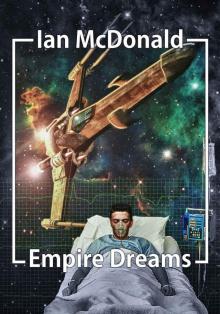 Empire Dreams
Empire Dreams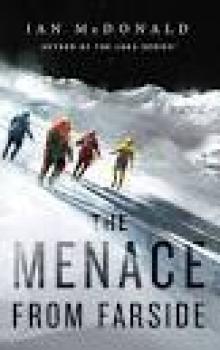 The Menace from Farside
The Menace from Farside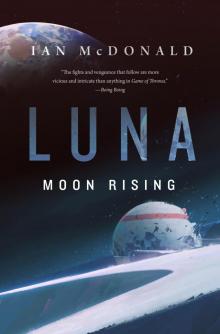 Luna: Moon Rising
Luna: Moon Rising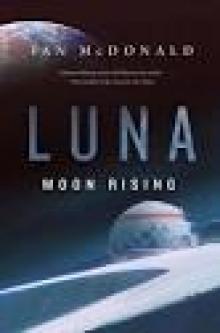 Moon Rising
Moon Rising Desolation Road dru-1
Desolation Road dru-1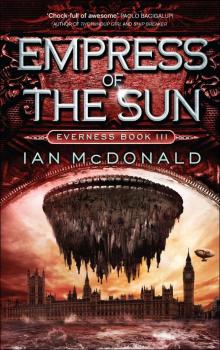 Empress of the Sun
Empress of the Sun Ares Express dru-2
Ares Express dru-2 Tendeléo’s Story
Tendeléo’s Story River Of Gods
River Of Gods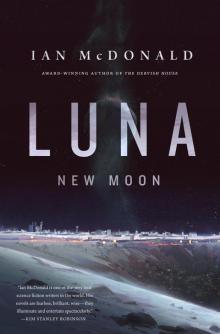 Luna
Luna![Cyberabad Days - [River of Gods 02] Read online](http://i1.bookreadfree.com/i1/03/29/cyberabad_days_-_river_of_gods_02_preview.jpg) Cyberabad Days - [River of Gods 02]
Cyberabad Days - [River of Gods 02]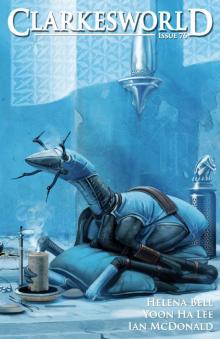 Clarkesworld Magazine Issue 76
Clarkesworld Magazine Issue 76 Brasyl (GollanczF.)
Brasyl (GollanczF.) Scissors Cut Paper Wrap Stone
Scissors Cut Paper Wrap Stone Chaga
Chaga Time Was
Time Was Cyberabad Days
Cyberabad Days Be My Enemy
Be My Enemy Changa
Changa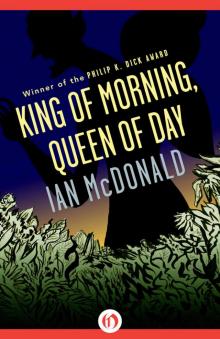 King of Morning, Queen of Day
King of Morning, Queen of Day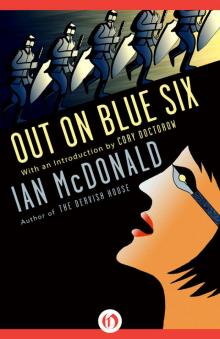 Out on Blue Six
Out on Blue Six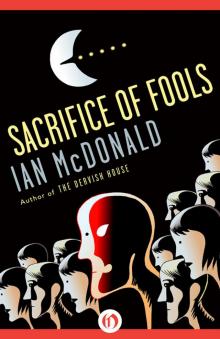 Sacrifice of Fools
Sacrifice of Fools Desolation Road
Desolation Road Luna--Wolf Moon--A Novel
Luna--Wolf Moon--A Novel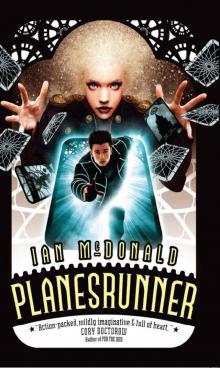 Planesrunner (Everness Book One)
Planesrunner (Everness Book One) Ares Express
Ares Express